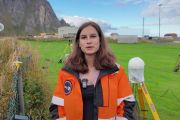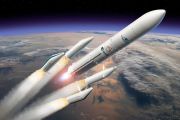
Copernical Team
Vodafone, AST pick Germany for European satellite network
 British telecoms giant Vodafone and US group AST SpaceMobile on Friday said they had chosen Germany to base satellite operations aimed at enhancing high-speed connectivity to remote areas of Europe.
The joint venture, named SatCo and first announced in March, aims to "further strengthen Europe's digital sovereignty", the two companies said in a statement.
The high-speed satellite connect
British telecoms giant Vodafone and US group AST SpaceMobile on Friday said they had chosen Germany to base satellite operations aimed at enhancing high-speed connectivity to remote areas of Europe.
The joint venture, named SatCo and first announced in March, aims to "further strengthen Europe's digital sovereignty", the two companies said in a statement.
The high-speed satellite connect Nanometer precision ranging demonstrated across 113 kilometers sets new benchmark for space measurement
 Researchers from the University of Science and Technology of China, led by professors Jian-Wei Pan, Hai-Feng Jiang, and Qiang Zhang, have achieved nanometer-level absolute distance measurement over a 113-kilometer path using a bistatic dual-comb ranging (BDCR) approach. This technique attained a precision of 82 nanometers within 21 seconds, establishing a new standard for high-precision long-dis
Researchers from the University of Science and Technology of China, led by professors Jian-Wei Pan, Hai-Feng Jiang, and Qiang Zhang, have achieved nanometer-level absolute distance measurement over a 113-kilometer path using a bistatic dual-comb ranging (BDCR) approach. This technique attained a precision of 82 nanometers within 21 seconds, establishing a new standard for high-precision long-dis Sustainable bamboo products offer alternative to plastic in ongoing global pollution fight
 A new research perspective explores the viability of bamboo as a replacement for conventional plastic products and evaluates its environmental advantages, technical potential, and current economic barriers. Plastic contamination, including microplastics and chemical pollutants, continues to threaten ecosystems and public health on a global scale. Responding to this challenge, over 175 nations ha
A new research perspective explores the viability of bamboo as a replacement for conventional plastic products and evaluates its environmental advantages, technical potential, and current economic barriers. Plastic contamination, including microplastics and chemical pollutants, continues to threaten ecosystems and public health on a global scale. Responding to this challenge, over 175 nations ha New satellite operations centre planned for Germany to support EU constellation
 Berlin, Germany (SPX) Nov 08, 2025
AST SpaceMobile Inc. and Vodafone Group have chosen Germany as the location for their principal Satellite Operations Centre, designed to allocate, map, and monitor satellite connectivity across Europe. The centre, which will be sited near Munich or Hannover, will coordinate the SatCo satellite system to supply mobile broadband services to public, private, and
Berlin, Germany (SPX) Nov 08, 2025
AST SpaceMobile Inc. and Vodafone Group have chosen Germany as the location for their principal Satellite Operations Centre, designed to allocate, map, and monitor satellite connectivity across Europe. The centre, which will be sited near Munich or Hannover, will coordinate the SatCo satellite system to supply mobile broadband services to public, private, and Saturn's icy moon may host a stable ocean fit for life, study finds
 New findings from NASA's Cassini mission show that Enceladus, one of Saturn's moons and a top contender for extra-terrestrial life, is losing heat from both poles - indicating that it has the long-term stability required for life to develop. The findings have been published 7 November in Science Advances.
A new study led by researchers from Oxford University, Southwest Research Institute a
New findings from NASA's Cassini mission show that Enceladus, one of Saturn's moons and a top contender for extra-terrestrial life, is losing heat from both poles - indicating that it has the long-term stability required for life to develop. The findings have been published 7 November in Science Advances.
A new study led by researchers from Oxford University, Southwest Research Institute a Quantum sensors on the China Space Station to probe dark matter and exotic physics
 The SQUIRE project is launching quantum spin sensors on the China Space Station to investigate exotic-boson-mediated interactions, encompassing 16 different theoretical forms that can shift atomic energy levels. The sensors are designed to detect pseudomagnetic fields generated by interplay between their atomic spins and geoelectrons found within Earth's crust and mantle.
The China Space S
The SQUIRE project is launching quantum spin sensors on the China Space Station to investigate exotic-boson-mediated interactions, encompassing 16 different theoretical forms that can shift atomic energy levels. The sensors are designed to detect pseudomagnetic fields generated by interplay between their atomic spins and geoelectrons found within Earth's crust and mantle.
The China Space S 3I/ATLAS Highlights Scale and Significance of Interstellar Objects Passing Through the Solar System
 3I/ATLAS, the third confirmed interstellar object tracked within our solar system, has brought renewed attention to the dynamic range of cosmic material moving through the Sun's domain. Detected by the ATLAS telescope array in November 2025, this object's high velocity, hyperbolic orbit and unusual composition exemplify why every confirmed visitor from interstellar space is both a scientific mil
3I/ATLAS, the third confirmed interstellar object tracked within our solar system, has brought renewed attention to the dynamic range of cosmic material moving through the Sun's domain. Detected by the ATLAS telescope array in November 2025, this object's high velocity, hyperbolic orbit and unusual composition exemplify why every confirmed visitor from interstellar space is both a scientific mil Cislune Partners with UCF on Simulation to Improve Decision-Making for Future Lunar Missions
 Funded by NASA, the research leveraged immersive technologies and insights across disciplines to examine trust dynamics between humans and machines, ensuring safety and success for future space exploration.
Computer science doctoral student Hiroshi Furuya uses a virtual reality headset to simulate a moon mission, aiming to improve human decision-making and astronaut - autonomous system int
Funded by NASA, the research leveraged immersive technologies and insights across disciplines to examine trust dynamics between humans and machines, ensuring safety and success for future space exploration.
Computer science doctoral student Hiroshi Furuya uses a virtual reality headset to simulate a moon mission, aiming to improve human decision-making and astronaut - autonomous system int ESA puts Insects on the menu for ISS
 Long before humans reached orbit, insects had already shown they could handle the hurdles of spaceflight. Light, highly adaptable and nutritionally rich, these resilient animals present an attractive option for European researchers studying reliable food sources for long-duration missions.
Eating insects is not unusual: billions of people do it every day. According to the UN's Food and Agr
Long before humans reached orbit, insects had already shown they could handle the hurdles of spaceflight. Light, highly adaptable and nutritionally rich, these resilient animals present an attractive option for European researchers studying reliable food sources for long-duration missions.
Eating insects is not unusual: billions of people do it every day. According to the UN's Food and Agr UCF helps shape the future of space hospitality and tourism
 As Florida's Premier University for Engineering, Technology and Innovation, UCF continues to lead the way in preparing students for the industries of tomorrow - including those that reach beyond Earth.
UCF students are participating in the Student Spaceflight Experiments Program (Mission 21), a national competition that provides students with the opportunity to design experiments for launc
As Florida's Premier University for Engineering, Technology and Innovation, UCF continues to lead the way in preparing students for the industries of tomorrow - including those that reach beyond Earth.
UCF students are participating in the Student Spaceflight Experiments Program (Mission 21), a national competition that provides students with the opportunity to design experiments for launc 




























